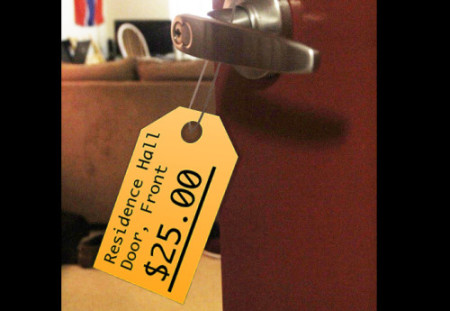By: Daniel Schryer and Hannah Bevis
In a statement that will come as no surprise to college students across the nation, money is a significant part of university living. Setting aside paying for classes and the usual room and board charges, students are also at the mercy of overpriced textbooks and expensive dining options. So what are resident students to think when the see an ominous addition to their online statemnt simply labeled “room charge”?
Almost reflexively, students express distaste for these seemingly superfluous charges. Sophomore Jenny Geraghty was less than pleased to see a $25 charge awaiting her after a broken light fixture wasn’t reported on the room condition report. “I was upset,” said Geraghty, “because it wasn’t really my fault.”
This misplacement of blame seems to be a common source of frustration for charged students living on campus. It is common knowledge that if nobody takes responsibility for damage to school property in the public spaces of residence halls, entire floors can be charged for the replacement expenses.
For all the frustration and financial fallout caused by these charges, there does appear to be a system in place that ensures that students are held accountable for the wear and tear of their dorm furnishings. Sarah Koukal, the director of residence life on campus, spoke about the ins and outs of room charges.
“At the end of every academic year or when the student moves out at the end of the term, the RA’s are responsible for going into the room and checking to see if the condition on the room matches the condition report,” said Koukal. “If they find a discrepancy one way or another, what the staff will do is note it and then at the end of the year the hall director staff is responsible for going through each and every room to double check that what the RA’s wrote down is accurate.”
Kyle Lepine, senior, was one such RA for Seybert and Seager residence halls. Lepine, who now works for the Office of Admissions, said that the process was one that was difficult to outmaneuver. “Most of the times when you look at the condition reports we filled out at the beginning of the year and compare it to the room at the end of the year, there’s a clear distinction between what’s okay and what’s been damaged,” said Lepine.
The process of determining room charges is one that spans multiple offices on campus. “Now accidents happen, so during the academic year typically if something gets accidentally broken, or if something fails, like if a blind mechanism gets broken, and students let their RA know, we can send maintenance in there and fix it before the end of the year,” said Koukal.
The maintenance department has the important job of rectifying any damages done to the room, in addition to determining the actual amount of money to charge the students. “Maintenance gives us a three to four page document every year that tells us specifically how much everything is and then maintenance goes through it with us at the end of the year.” explained Koukal. “So basically it’s just a bunch of days at the end of the year where we work with the maintenance team to go through and confirm that the charges that we’re assessing are correct.”
Koukal also elaborated on the dreaded group charges: “During the year, we see a lot of group charges. To give you an example, in Seager (several years ago), someone went around and switched all the number plates so the whole floor was going to get charged if we didn’t know who did it. Ultimately, someone knows who did it, so as part of the community (they are responsible) for holding someone accountable.” The Office of Residence Life expects students to practice moral and responsible behavior, and reflects such a goal in their housing policies.
Koukal also said that students should be thorough when looking for signs of pre-existing damage to their rooms if they don’t want to be fined. “The best way is to really look at one’s room before the end of the year and see if there are things that are broken or excessively dirty,” said Koukal. “If there are, definitely report it to your RA and they can get maintenance in.”
Koukal is quick to remind students that this is all for the benefit of students who will be new to living in that particular building next year, making their experience at NCC a clean and enjoyable one. “That’s why we do health and safety checks weeks 8, 9 and 10, so that we’re getting into rooms and saying ‘you might want to look at that’ before closing.”
“We try to be as fair as possible,” said Koukal, “and students are welcome to ask our office if they have any questions.”

